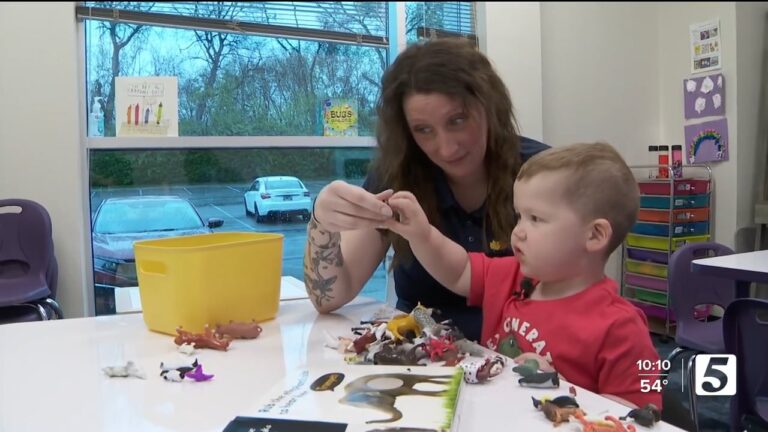Table of Contents
What can I do for my child who is becoming an adult with autism?
When you’re raising a child with autism, it can feel like every stage of life brings new challenges and opportunities. The journey doesn’t end with childhood; it simply changes shape. For many parents, one question becomes louder as the teenage years approach and they think about autism in adults: “What can I do for my child becoming an adult with autism?”
This powerful and emotional question doesn’t have a one-size-fits-all answer. Growing up is a complex journey. This journey doesn’t end at 18 or 22. Adults with autism can achieve remarkable goals, like pursuing higher education, finding employment, living independently, or forming lasting relationships. However, reaching these milestones requires thoughtful preparation, ongoing support, and a deep understanding of how autism affects individuals as they navigate the complexities of adult life.
In this blog by ABA Centers of Tennessee, we’ll explore what autism in adults looks like, what to expect during the transition to adulthood, and how you can prepare your loved one for what comes after high school.
Understanding Autism in Adults
When most people think about autism, they imagine a child receiving services, learning communication strategies, or navigating school. But autism doesn’t disappear after childhood; it’s a lifelong condition.
According to Autism Speaks, many adults on the spectrum remain undiagnosed until later in life because their signs might differ from those in children with ASD.
Some of the most common signs of autism in adults include:

- Social Communication Difficulties: Adults with autism may struggle to understand social cues, maintain eye contact during conversations, or engage in small talk. Autism symptoms in adults may include difficulty making conversation, social anxiety, and limited interest in only a few activities.
- Routine Rigidity: Many adults on the autism spectrum demonstrate a preference for structure and consistency in their daily lives. This characteristic can influence their comfort level when encountering new situations or venturing into unexplored settings.
- Sensory Processing Challenges: Hypersensitivity to lights, sounds, textures, or crowds can significantly impact daily functioning and workplace performance.
- Direct Communication Style: Adults on the autism spectrum tend to be straight-talking, which can come across as bad manners to some people.
- Challenges with Executive Function: Organizing tasks or managing time can be challenging for adults with autism.
At the same time, many adults with autism demonstrate remarkable strengths, such as problem-solving, creativity, and loyalty. Recognizing these qualities is just as important as understanding the challenges.
Autism Adulthood: What Changes After High School?
We can describe the shift from adolescence to adulthood as the most critical stage for individuals on the spectrum. In school, children with autism have access to resources and support services thanks to laws like the Individuals with Disabilities Education Act (IDEA), which ensures students with autism can get extra support and the services they need.
But what happens after graduation? That’s where many families feel unprepared. The safety net provided by school systems begins to disappear, leaving parents to navigate adult services, employment opportunities, healthcare, and housing on their own.
This period is sometimes referred to as the “services cliff.” Without proactive planning, young adults with autism may lose access to essential supports just when they need them most.
Autism Transition to Adulthood: Key Areas to Focus On
So, how do families prepare for the next stage? Below are essential steps for supporting the transition of your child with autism into adulthood:
- Start Early: Beginning conversations about adult goals and necessary skills during early high school years provides more time for skill development and adjustment.
- Research for Education and Career Pathways: For many families, the big question is: What comes after high school? Options include:
- Higher education with accommodations and disability services
- Vocational training programs that teach job skills and independence
- Supported employment services that connect individuals with autism to inclusive workplaces
Harvard Health research shows that with the proper support, adults with autism can thrive in careers that match their strengths, particularly in structured or detail-oriented environments.
- Focus on Independent Living Skills: Daily living skills become increasingly important as young adults prepare for independence. Helping your kid learn everyday skills like chores, making meals, shopping, managing money, and getting around on buses or trains is really important for preparing them for adult life.
- Ensure Access to Healthcare and Mental Health: Adults with autism may face additional challenges with anxiety, depression, or other health conditions. Building strong relationships with healthcare providers who understand autism is essential for long-term well-being.
- Social Connections and Community Engagement: Isolation is a risk for adults on the spectrum. Encouraging hobbies, volunteer opportunities, or peer groups can help build meaningful social networks. At ABA Centers of Tennessee, we offer seasonal events for families on the autism spectrum where they can learn and practice valuable skills while socializing and bonding with the community.
- Build Self-Advocacy Skills: Adults with autism need to understand their strengths, challenges, and accommodation needs. Practicing self-advocacy during the teenage years prepares them for adult environments where they’ll need to communicate their needs effectively.
The Role of ABA Therapy in Supporting Adults with Autism
When most people hear about Applied Behavior Analysis (ABA) therapy, they think of early childhood intervention. While ABA is most effective in young children, its benefits extend well into adulthood.
ABA therapy is the gold standard in autism care. Experts have meticulously studied this approach for over four decades, demonstrating outstanding results in skill development, coping mechanism acquisition, fostering autonomy and independence, and managing challenging behaviors.
For teenagers becoming adults with autism, ABA therapy can support specific goals such as:
- Workplace social skills and communication
- Independent living skills
- Managing anxiety and challenging behaviors
- Community integration and safety
- Building life and job readiness skills
- Stress management and coping strategies
Even as your child grows, therapists design ABA programs to their needs. For example, sessions may focus on navigating college classes, preparing for job interviews, or handling the sensory demands of a new workplace. Notably, ABA therapy doesn’t just support the individual; it empowers families with strategies to encourage growth at home.
Building a Comprehensive Support Network for Autism in Adults
Creating a productive progression to adulthood requires a team approach involving the individual with autism, family members, educational professionals, healthcare providers, and community support services. This collaboration should begin years before the actual transition and continue throughout adult life.
Not every adult on the spectrum receives a diagnosis as a child. In fact, many people don’t discover they are autistic until later in life, often after years of struggling to fit into social or professional settings.
A diagnosis in adulthood can bring relief; it helps explain lifelong challenges and opens the door to supports that were previously inaccessible. At the same time, it can also bring grief or regret about missed opportunities. Families supporting adults newly diagnosed with autism should approach the process with compassion, recognizing that self-understanding is healing and transformative.
Moving Forward Together with ABA Centers of Tennessee
Navigating autism in adults is a journey filled with both challenges and hope. From planning for life after high school to fostering independence and building meaningful connections, every step matters. While the transition to adulthood can feel overwhelming, you are not alone.
At ABA Centers of Tennessee, we are here to support families from Brentwood, Hendersonville, Nashville, or Madison through every stage of life. Whether you’re seeking diagnostic testing, ABA therapy, or guidance on transition planning, our team is ready to walk with you.
If you’re asking yourself, “What can I do for my child becoming an adult with autism?”, reach out to us today by calling (844) 423-9483 or connecting online. Together, we can build a future where your loved one thrives.








